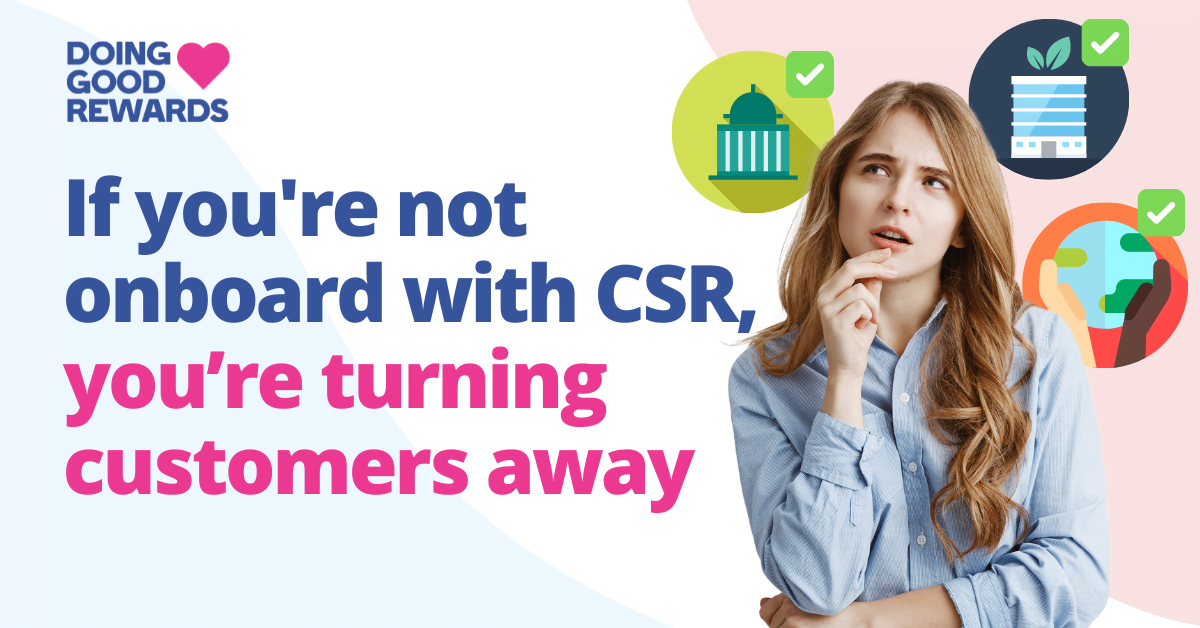
If you’re not onboard with CSR, you’re turning customers away
The concept of assessing environmental, social, and governance (ESG) factors in the corporate world has come a long way since the term was first coined in the late 90s.
It started out as a way of considering non-financial factors when determining a company’s value. It signalled a clear recognition that the relentless pursuit of profit at the expense of ethical operations was a thing of the past.
Investors were leading the way. Given the choice, it made more sense to invest in enterprises that were good corporate citizens. After all, there was less risk that a company doing things the right way could be liable to get itself into regulatory trouble or be exposed to damaging ‘bad publicity’.
Over a relatively short time, it became accepted that companies with solid ESG policies and practices would be viewed more favourably than competitors without them. Corporate social responsibility (CSR) was a real thing with real significance.

Investors set the trend and consumers followed
As a broader social consciousness developed, consumers followed the lead of investors in actively seeking out businesses that espoused values that matched their own.
That trend had started many years earlier when it became widely known that some cosmetic companies tested their products on animals. Not only did awareness and activism force an end to the abhorrent practice but it also led brands to promote their products as having been developed with no animal testing.
Not surprisingly, companies soon realised that they would be regarded more favourably if they informed consumers that they believed in and adhered to a range of ethical and sustainable practices.
So, if you want to find out how a large corporation sources its raw materials, manufactures its finished products, treats its workforce, packages and distributes its goods, and even what it does with its profits, a lot of that information is now widely available in the public domain.
ESG is a way to measure CSR
There are now various independent global agencies that analyse, rate, and report on how comprehensive and impactful the corporate social responsibility initiatives of big businesses, particularly listed companies, are.
However, ESG is about much more than managing public perception. It’s a way to safeguard a business from future risks and make the business itself more sustainable.
This is what the E, S and G are all about:
Environmental looks at the impact of resource consumption on the environment, including a business’s carbon footprint, wastewater discharge, and other environmental impacting activities.
Social refers to how a business interacts with communities where it operates, as well as its internal policies related to labour, diversity, and inclusion policies.
Governance relates to internal practices and policies that lead to effective decision making and legal compliance.
As global regulatory advisory company RegASK puts it: “ESG facilitates top-line growth in the long run, attracts talent, reduces costs, and forges a sense of trust amongst consumers.”

Customers care – and want to know you do, too
The true ‘bottom line’ is that CSR is no longer merely a nice thing to have in your back pocket, in case someone asks. It’s become a must-have, moving out from behind the counter to front and centre.
A generation of consumers who are more aware of climate and other environmental issues was enough to make that happen. Add the impact of the global health crisis on our collective consciousness, and you can understand a further shift toward conscious consumerism.
Various studies are reporting that people are being a lot more thoughtful and careful about what they do and how they do it – and that includes how they spend their money.
Mastercard’s recent report into the Top retail trends to watch in 2022, for example, has a section on ‘Buying with a purpose’.
Their study found that “Across the world, 85% of adults say they’re willing to take personal action to combat environmental and sustainability challenges. And 62% say it’s now more important that companies behave in sustainable and ecofriendly ways.”
How do you show that you care?
So, nearly two-thirds of people say companies should behave in sustainable and ecofriendly ways. That’s well past the point of ‘nice to have’. But what sort of corporate social responsibility strategies can you implement?
The Mastercard report states that consumers are looking for retailers that have a position and use that position to create and deliver products in a sustainable way, such as reducing plastic packaging.
In addition to the environmental and sustainability initiatives we’ve become more familiar with over recent years, brands are also expanding their focus to social justice and inclusivity.
From the perspective of a local business, switching to greener packaging and digital receipts might be a logical and relatively simple starting point.
Contributing to charity is an extremely meaningful and impactful measure, as is encouraging your customers to join you.
In short, anything that demonstrates how you’re taking action (as opposed to just thinking or talking about meaningful change) will resonate with consumers who also want to make a difference.
You could start right now by creating a truly rewarding shopping experience with positive social impact at https://bit.ly/3vfGMfL
Recent Posts
- 4 Tips For Communicating Your Social Impact
- Changemaker Consumers: 2023 Trends All Brands Need to Know
- Put your holiday spending to great use this holiday season!
- Stop just giving money to charity and go ‘full CSR’ with purpose
- The right way to promote and profit from your Corporate Social Responsibility credentials
Categories
Click here to email us & we’ll contact you to send more info
Click here to book a 15 min Zoom meeting to find out more
What would you like to do?

Stay ahead of the trends and the competition
Download Free PDF

